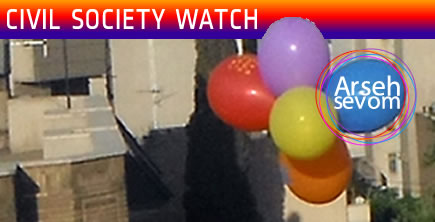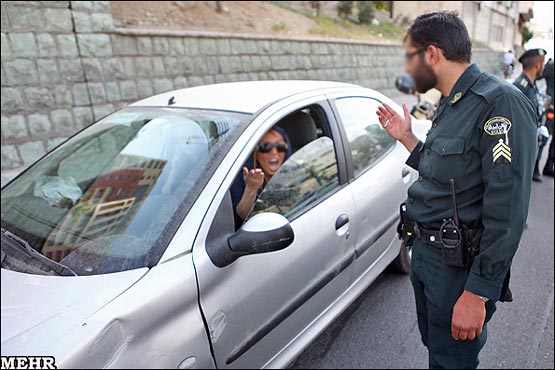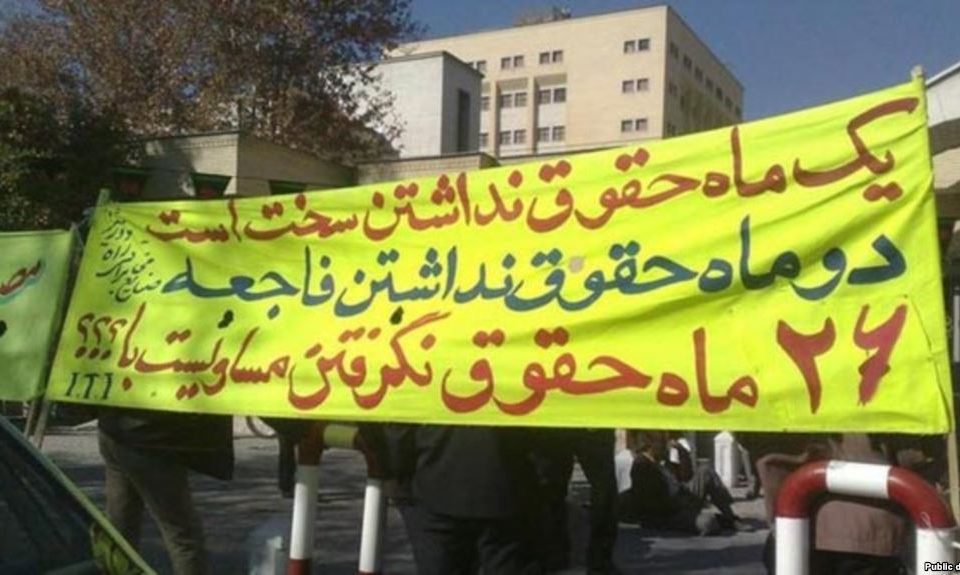
United for Iran Condemns Religious Ruling Against Rapper Najafi
May 18, 2012Azerbaijan: Democracy is a Motor that Needs Constant Maintenance
May 23, 2012Arseh Sevom — Last week as the world marked the international day against homophobia and transphobia. In Iran, small actions such as posing with a rainbow flag, flying multi-colored balloons, and the release of a short film filled featuring the comments of Gay Iranians marked the day. Tehran’s air quality caused alarm, more of those out on bail were summoned to serve time in prison, and the campaign against bad hejab took to the streets. These stories and more follow:
Anti-Homophobia Campaign in Iran
May 17th marked the International day against homophobia and transphobia. While sodomy remains an offense which can be punishable by death, youth in Iran have begun a Facebook campaign to voice a message of anti-homophobia. Click here for a report in Persian accompanied with photos of small actions of defiance.
An Iranian student organization called “Iranian Liberal Students and Alumni” has issued a memo demanding an end to all kinds of homophobic behavior.
Are There Homosexuals in Iran?
“Our tradition is one of love,” says a man interviewed as part an eleven minute film featuring a number of young Gay and Lesbian Iranians. “What we got from the West was actually homophobia, not homosexuality.”
The entire film is available on YouTube. In Persian, with subtitles.
Internet Repression Especially Difficult for Iran’s LGBT Community
Small Media Foundation released a report on Iran’s online LGBT community. They report:
“Blogging has been central to the lives of Iranian LGBTs since it ventured online, but posting content online and interacting with other internet users is also inherently dangerous. LGBT bloggers and social media users living within Iran‘s borders must protect their identities stringently and reports of people being entrapped by the authorities on LGBT dating sites are prevalent.”
The complete report can be downloaded as a pdf by clicking here.
Noam Chomsky Joins “Speak Out for Imprisoned Students” Campaign
The American scholar, Noam Chomsky, has joined the “Speak out for imprisoned students” campaign in solidarity with the Iranian students. Chomsky’s message reads:
“I would like to join in the appeal to the Iranian Government to release the students who have been imprisoned on alleged security-related crimes, without the semblance of a fair and open trial. Surely the time has come to release them and allow them to return to their studies and to pursue their political activities without interference, and to make their contributions to the flourishing Iranian society and the world of peace and freedom to which all of us aspire.”
One Step Closer to Fully Segregated Universities
In an interview with the Iranian Student News Agency (ISNA), the head of the free education office of the Ministry of Science, Research, and Technology discussed plans to segregate more universities, announcing “the highest number of applications for establishing gender segregated institutes of higher education are from the provinces of Tehran and Khorasan-e-Razavi.” He added that permits will also be issued for segregated institutions in the cities of Urumiyeh, Shiraz and Sari and the provinces of Khuzestan, Kermanshah, Zanjan and Golestan.
1800 “Amin Madrasas” to be Founded
In addition to gender segregation at the university level, the Iranian educational system is to undergo another transformation with the establishment of alternative religious schools – Amin Madrasas (schools).
Tehran’s Shargh newspaper reports that 1800 pre-seminary schools are to be opened across the country. Based on the plan, these schools will work at the levels of primary, middle, and secondary school for boys and girls, teaching “religious sciences” along with general subjects to the students.
Out on Bail? Into Prison
Over the past few weeks, journalists, lawyers, scholars, and other activists have been arrested or summoned to prison to serve prison terms. This past week was no exception.
Jaras posted a report of journalist, translator, and Opinion Desk editor of Shargh Newspaper of Tehran, Rahman Boozari, being transported with Ward 350 of Evin Prison where he was is to serve the sentence of “two years imprisonment and 70 lashes.” He had been arrested last year and June and was out on bail when he received the summons to report to prison to serve his term.
According to a report from Human Rights Activists News Agency (HRANA), Boozari was in the process of defending his Masters’ thesis in Philosophy. Despite an earlier agreement to allow him finish his thesis defense and then begin his prison term he was summoned by an unexpected telephone call on Saturday (19th of May).
Monday, May 21, Fariborz Raisdona, a prominent economist known for his outspoken criticism of corruption, was also summoned to serve a one-year sentence. He was arrested in 2010 after criticizing subsidy cuts in an interview with BBC Persian.
Case Dropped but Cartoonist May Still be Flogged
An Iranian cartoonist from Arak, Mahmood Shokraiyeh, was sentenced to 25 lashes for drawing his local MP, Ahmad Lotfi. (See our weekly review of May14, 2012.)
Kaleme now reports that, the head of the Justice Ministry’s branch in Arak has announced that “despite the case having been dropped by Lotfi,” the verdict is still in effect, and “if Mahmood Shokraiyeh does not appeal within 20 days, the sentence will be executed.”
“Say You Received Money from Foreigners or Go to Jail”
Last week, human rights activist, lawyer – and now prisoner of conscience – Mohamad Ali Dadkhah, told the International campaign for human rights in Iran, that he is under immense pressure by his interrogators to make televised confessions that he received money from foreigners or go to prison. Dadkhah said, “and [obviously] I will go to prison and not even leave my motherland.”
Six Awhazi Arabs Face Unfair Trials
Amnesty International has expressed fears that six Ahwazi Arabs arrested in February face unfair trials and risk torture. The six are charged with the vague offenses so many dissidents and minorities find themselves facing: “enmity against God,” “gathering and colluding against state security” and “spreading propaganda against the system.” They went on trial May 20th.
More Fatwas Against Rapper, Activists Protest
Shahin Najafi’s new controversial song, Naghi, continued making news last week. The number of likes on one of the several Facebook pages dedicated to the rapper has now reached 221,015. Ayatollahs Makarem Shirazi (who also issued a ruling calling the Holocaust a superstition ) and Hossein Nouri-Hamedani, have weighed in on the side of the death fatwa, ruling Najafi an “apostate” (more here and here).
Our colleagues at United For Iran issued a statement on the religious ruling against rapper Shahin Najafi, calling on Iranian authorities to condemn the incitement to murder from clerics and other forces. Read more about the case here.
Iranian Morals Police Chief: Not all Dishes Work!
Last week, the chief of Iranian morals police police, Ahmad Roozbehani, announced the national re-launch of the moral security project. Discussing the project’s details at a press conference, Roozbehani said that “the police tell those [women] who display some of their hair [to observe the hijab correctly] but those who appear in the streets like ‘fashion models’ will be directed to police headquarters to wear decent clothes and sign guarantees that they will not repeat such behavior.”
Roozbehani also claimed that people watch less satellite TV now, and “not all satellite dishes on rooftops work.”
Aftab News reports Roozbehani as saying, “importing satellite receivers is organized and connected with soft threats [to Iranian society].” Aftab highlights Roozbehani’s explanation for a decline in the implementation of the moral security plan during the past years as “due to the unrest that followed the Presidential Elections in 2009.”
For images of the recent crackdown, click here.
Tehran’s Air Quality Reaches Alarming Levels
The general manager of the Air Quality Control Company of the Iranian capital, Tehran, said last week that the air quality in the 13-million-people metropolis reached alarming levels and “like before, people with heart problems, pregnant women, and children are asked to refrain from unnecessary commuting in the city.”







